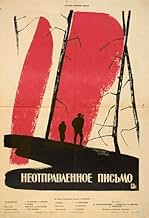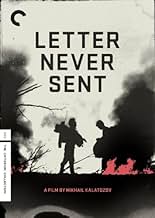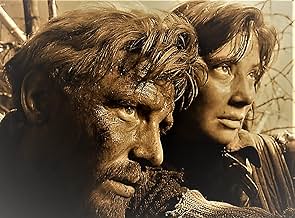CALIFICACIÓN DE IMDb
7.8/10
4.4 k
TU CALIFICACIÓN
Cuatro geólogos buscan diamantes en el desierto de Siberia.Cuatro geólogos buscan diamantes en el desierto de Siberia.Cuatro geólogos buscan diamantes en el desierto de Siberia.
- Premios
- 1 nominación en total
Innokentiy Smoktunovskiy
- Konstantin Sabinin
- (as I. Smoktunovskiy)
Tatyana Samoylova
- Tanya
- (as T. Samoylova)
Vasiliy Livanov
- Andrey
- (as V. Livanov)
Evgeniy Urbanskiy
- Sergey Stepanovich
- (as Ye. Urbanskiy)
Galina Kozhakina
- Vera
- (as G. Kozhakina)
Argumento
¿Sabías que…?
- TriviaIn 1995 the film was restored by and shown in United States upon the financial support from Francis Coppola.
- Citas
Andrey: Sergei, you've fallen in love with a girl who loves someone else, and that man loves her. From the moral standpoint it's wrong.
Sergey Stepanovich: I don't give a damn about your bookish morale. I'm in love.
Andrey: That's an egoist speaking.
- ConexionesFeatured in Fejezetek a film történetéböl: A szovjet film 1953-1970 (1990)
Opinión destacada
The fate of the film otherwise, as difficult, can not be called. The film was nominated for the Palm d'Or of the Cannes Film Festival in 1960 and was scheduled to be shown on May 17th. However, literally on the eve of presentation the application for the film in the competition program of the film festival was withdrawn. Although, as we all know, all countries, all film companies and all directors, not to mention actors, are passionately interested in participating in international film festivals. Moreover, such prestigious as Cannes.
There are two versions of the explanation of the reasons for such an emergency withdrawal of the application. According to the official, the director of the film, Mikhail Kalatozov, suddenly wanted to fix something in the film, so that by the premiere in the USSR, scheduled for June 27, the film would not have a single flaw. According to the second, unofficial version, the application was withdrawn by the leaders of the USSR State Committee for Cinematography, who suddenly realized that the film shows how the means for socialist industrialization (in the film - diamonds) are sought at the cost of human lives (in the film - of geologists).
For me personally, the second version seems to be more plausible. And that's why. The film is brilliant! Filmed by director Kalatozov and cameraman Sergei Urusevsky, both are triumphants of the Cannes Film Festival in 1958 for the film "The Cranes Are Flying." Top actors of the then Soviet cinema play in the film: Innokenty Smoktunovsky, Yevgeny Urbansky and incomparable Tatyana Samoilova. The high class of the picture also underlines the fact that literally the next year the film was released on European screens, and a year later - on the screens of US cinemas. But I don't remember whether this film was shown in the USSR in the 1960s - 1970s.
However, human memory is an unreliable tool. Therefore, I turned to Kinopoisk for information on the number of viewers who watched this film in its first year. No such information! About the films that were released on the screens in the same years, for example, "The Ballad of a Soldier," there is such data. About earlier films, for example, "The Cranes Are Flying" or "True Friends", etc., there is such information. And about the "Letter Never Sent" - no! What can it say? Either the film was taken off the screen immediately after the premiere, or released in such a limited number of copies that it cites data on the viewing of a Soviet film in the Soviet Union by the number of viewers smaller than, say, in France, to put it mildly, uncomfortable. This is why data is absent.
And no more any nomination for any film festival. Although it would seem that the premiere took place, it means that the director eliminated all the flaws. Why not to nominate? Especially since Tatyana Samoilova, after "The Cranes Are Flying," was in world cinema a star of the first brightness.
After the premiere of this film in New York, The New York Times responded - a rare case! - quite a benevolent review, however, without attribution. So, we can assume that this review reflects the opinion of the entire editorial board of the newspaper. Of course, a significant part of the review was dedicated to our great Actress Tatyana Samoilova. But the film itself was addressed very flattering epithets: "FOR sheer photographic pull and intensity, "The Letter That Was Never Sent" is unlike any other Russian film drama in many years, ...a truly rare movie, stark in content and setting, pretentious and obscure at times, but of a marvelous pictorial texture. See this unorthodox Russian movie, hold on (like the determined cast) and we guarantee it will get you."
And therefore it is not at all surprising that Francis Ford Coppola in 1995 funded the restoration and re-rental of this painting in the United States. Perhaps this is due to the fact that of all countries, this film has the highest rating in the United States. Overall, 64% of IMDB and Kinopoisk users around the world gave this film a rating of 8 to 10.
Based on the foregoing, the rating of the film according to the FilmGourmand's version is 7.826. And this low rating is due primarily to the fact that the Soviet leadership at one time prevented the participation of the film in any film festivals and narrowed the scope of the film to the maximum extent possible in cinemas. But, nevertheless, the film is included in the FilmGourmand's Golden Thousand with Rank 947.
- konstantinkliushkin
- 11 may 2020
- Enlace permanente
Selecciones populares
Inicia sesión para calificar y agrega a la lista de videos para obtener recomendaciones personalizadas
- How long is Letter Never Sent?Con tecnología de Alexa
Detalles
- Fecha de lanzamiento
- País de origen
- Sitio oficial
- Idioma
- También se conoce como
- Letter Never Sent
- Locaciones de filmación
- Mosfilm Studios, Moscú, Rusia(Studio)
- Productora
- Ver más créditos de la compañía en IMDbPro
- Tiempo de ejecución1 hora 36 minutos
- Color
- Mezcla de sonido
- Relación de aspecto
- 1.37 : 1
Contribuir a esta página
Sugiere una edición o agrega el contenido que falta

Principales brechas de datos
By what name was La carta que no se envió (1960) officially released in India in English?
Responda
























